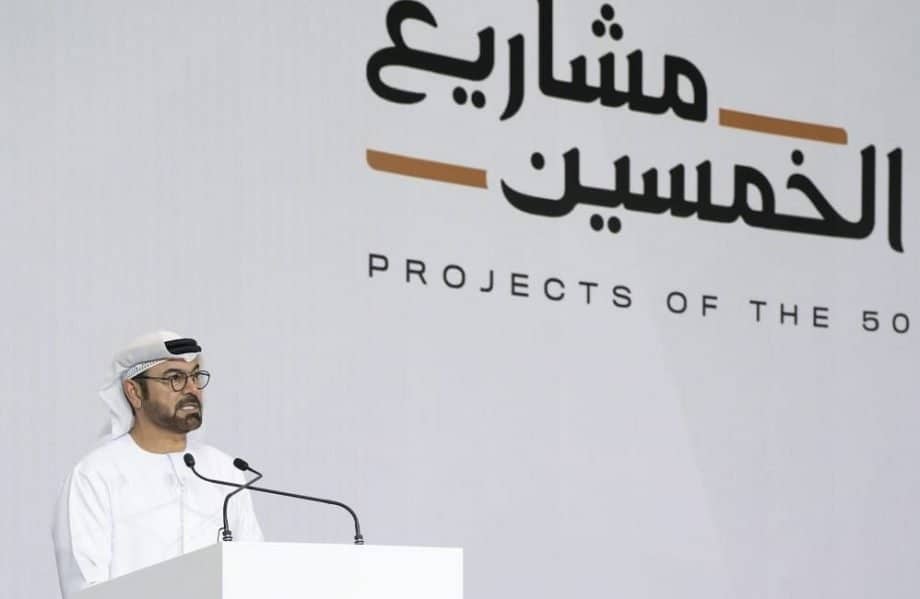On Sunday, a series of major projects to boost the UAE’s economy and development were revealed.
As part of its ‘Projects of the 50’ plan, ministers presented the latest 13 plans at Qasr Al Watan, Abu Dhabi’s Presidential Palace.
In addition, the UAE seeks to increase Emirati employment in the private sector and boost the nation’s human capital.
Within five years, all private sector companies in the UAE should have at least 10% Emirati employees.
Sheikh Mansour bin Zayed, Deputy Prime Minister and Minister of Presidential Affairs, and Mohammed Al Gergawi, Minister of Cabinet Affairs, attended the announcement.
Emiratis are offered financial incentives in the private sector
The first to be announced was a plan to spend up to Dh24 billion ($6.53bn) to hire 75,000 Emiratis in the private sector, Mr. Al Gergawi said.
Citizens of the UAE will be offered incentives for choosing private-sector jobs.
Those who graduate from the university will be encouraged to take up jobs in the private sector, with the government offering to boost their salaries to make their choice more appealing.
In the private sector, for example, the government would increase an Emirati graduate’s salary by 5,000 dirhams a month, as well as pay support to their children.
A separate plan allows federal employees to take a sabbatical on 50 percent of their salary to start their own businesses. Furthermore, Emiratis over the age of 50 who retire early will receive financial grants to assist them in starting a business.
The 13 latest projects
1) Emirati Talent Competitiveness Council:
With Sheikh Mansour bin Zayed as chairman and Sheikh Abdullah bin Zayed, Minister of Foreign Affairs and International Co-operation, as vice-chairman, the council brings together representatives across the federal government. It aims to provide 75,000 Emiratis with private-sector jobs and strengthen private-sector partnerships.
2) Emirati Salary Support Scheme:
Emirati graduates are provided a grant for recruitment and training fees in the private sector, with a top-up of up to Dh8,000 during their first year of training and up to Dh5,000 during the following five years after that. A top-up is dependent on achieving defined targets and is conditional.
3) Merit Programme:
Emirati workers in specialized fields, including nursing, accounting, and financial auditing, as well as lawyers, financial analysts, and coders will receive a fixed salary increase of Dh5,000 per month for five years.
4) Pension Programme:
An Emirati employee earning under Dh20,000 per month will receive a subsidy against his or her pension plan contributions for five years. Furthermore, the government pays a contribution on behalf of the company to the cost of pension plans for Emirati staff in the first five years of employment, resulting in the company paying no contribution to the cost of pensions for Emirati employees in the first year of employment in the private sector.
5) Child Allowance Scheme:
To help with childcare costs, Emirati employees working in the private sector will receive an allowance of up to Dh800 per child, up to a maximum of Dh3,200 per month. The program will last until the age of 21.
6) Talent Programme:
The Emirati government has invested Dh1.25 billion in developing specialized vocational skills for Emiratis, including international certifications in property management, accounting, business management, and technology skills.
7) Apprentice Programme:
Providing Emiratis with a train-to-hire procedure to improve their skills in private and semi-private companies with a variety of financial incentives across a range of business sectors.
8) Recruitment Targets:
It is required that a minimum of 10 percent of employees be Emiratis within five years in the private sector. The UAE should increase this figure by 2 percent a year until it reaches 10 percent, and job opportunities should be offered to UAE nationals in knowledge- and skill-based fields.
9) National Healthcare Programme:
An educational grant program for the development of 10,000 Emirati health care workers over the next five years. The programme will consist of a Higher Diploma in Emergency Medicine and a Bachelor’s degree in Nursing. The programme is supported and led by Fatima College of Health Sciences.
10) Unemployment Benefit:
The benefits are paid to Emiratis who are unemployed due to circumstances beyond their control, allowing them to find another job for a period of six months.
11) Start-up Break:
Emiratis in federal government positions will be able to take a 6-to-12-month career break to start a business. Half of the employee’s salary would be paid while they are away. Each year, a limited number of employees will be eligible for the program.
12) Early Retirement:
Emiratis working for the government can take early retirement in order to explore business opportunities and start a business in the private sector. Will include the financing of five years’ salary payments or a lump sum golden handshake payment. A limited number of employees per year will be eligible for this program with employer permission.
13) Graduate Fund:
Keeping with the theme of supporting university and fresh graduates, the fund provides microloans under the patronage of Sheikh Mansour bin Zayed, in collaboration with UAE universities.
Sheikh Mohammed bin Rashid: ‘The future is in the private sector’
Sheikh Mohammed bin Rashid, Vice President and Ruler of Dubai, said: “Today, we have clear and supported targets for the percentage of citizens in the private sector. The future is in the private sector.”
